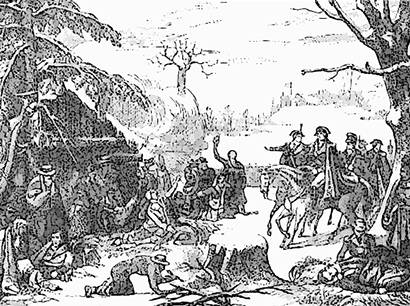This Week's Story
subscribe to podcast [click here] or play audio below
Discouragement, disease, and starvation stalk American soldiers at Valley Forge!

This Week’s Story relives American history and the Bible through brief inspiring stories presented on mp3 audio recordings and text for reading.
Footprints in the Snow, part one
Nate’s brother staggered as he tried to march ahead.
“Just walk, Alex. Left foot, right foot. No, don’t stop.”
Alex mumbled, “Nate, what did you say? Left foot, right...was it right? I can’t remember. What’s wrong with me?”
“Hey brother, we’re together. Your body is messed-up; I know. Your legs ache, because you’re cold. You’re hungry. We haven’t had enough to eat for days. But you’re standing. Alex, you have marched through mud, snow, and freezing rain.
“Think about what you have done. You wanted to join the army and be with me fighting for independence from the British. You did; and I’m proud of you!”
“Nate, do you think about sleeping in a warm bed and having dry socks?”
“I do, and I dream about hunting deer and having meat for supper. Tonight we’ll be at Camp Valley Forge. Maybe we’ll have some warm soup. General Washington said that our troops will stay in
the valley for the cold winter months. Even though the British are near, our position will be good for defense.”
As the General rode by, a smile lighted Alex’s face. “I feel better when he’s with us. But Nate, why is he here? He’s Commander-in-Chief! He could be warm and in generals’ housing.”
“Alex, we’re his men. He wants to know how we’re doing.”
The brothers trudged onwards with the American Continental Army whose forces now, in December 1777, numbered only 11,000 men. As Nate moved, he thought, “I’m twenty-two, but my body feels so old. I want to fight for freedom. But, oh God, our losses are so bloody and many. We need your help!”
When the brothers and the regiments of men with them reached Valley Forge, they needed shelter better than their tents. They built about 700 simple log cabins with no windows or floors.
Alex was assigned to work with the camp cooks. He told Nate, “Don’t wonder what you’re going to eat here. It will be flour or cornmeal mixed with water and fried. It makes me furious that we starve and our enemy sits nearby in comfort occupying our capitol.
I overheard two officers say that General Washington had written the president of the Congress that there has to be a change or the army will fall apart. We must have supplies!”
During the first three months at Valley Forge, Alex, Nate, and the men with them struggled with hunger and cold. Walking for many was torture. The ground was frozen with snow or it was slushy mud. Men, without shoes or socks, tried desperately to find ways to cover their feet. They marked the snow with their blood as they walked with cuts and feet black with frostbite.
After drills men, who were nearly naked from lack of clothing, huddled around fires. Their best covering, a thin blanket.
They died, not from bullets, but from diseases. Dysentery and typhus destroyed their bodies. Their camp was a contaminated disaster. Their horses died and rotting carcasses littered fields. Many men refused to use outhouses. The camp fields stunk.
Each morning General Washington moved from regiment to regiment talking with his men. Remarks to his officers showed he was bitter with Congress and sorrowed to see his men suffer. He endured; and because he did, his men did. His faith in God was no secret. He urged the soldiers to attend Sunday worship services and practice habits of good character. The men of Valley Forge, who endured, became the heart of the American Continental Army. They fought until freedom was won three years later.
This is Barbara Steiner. I look forward to sharing a story of help that came to the men of Valley Forge. Please check out: thisweeksstory.com.
<< previous story] [next story >>
We invite your comments! [click here to comment]
The soldiers went through hard times and the weather was bad. Many of the soldiers died from disease. from Pedro
I think it is amazing how George Washington cared about his soldiers. They went through horrible suffering. To walk through snow with bare feet and to be starving showed their tenacious. from Elizabeth
The part that made me think the most was that many of these ment didn't die in the battlefield; they died because of diseases. from Sunny
I thought the Congress was very unhelpful to the American troops. It made me sad how the soldiers died from frostbite and diseases. I'm glad they went to worship services so God could strenthen them. from Fatima
This Week's Story is a non-profit supported by listeners. [click here to make a donation]
